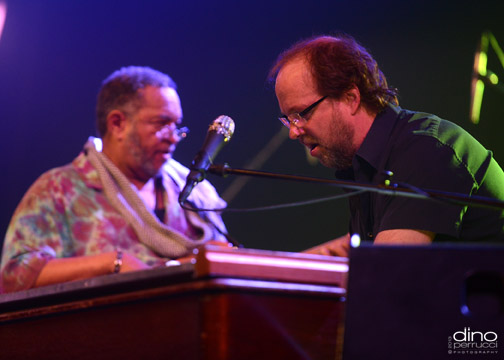
Photo by Dino Perrucci
There are few things that sound like a better idea than the Meter Men. Whoever thought of getting funk pioneers Leo Nocentelli, George Porter Jr. and Zigaboo Modeliste of The Meters to join forces with Phish’s Page McConnell was clearly onto something. On paper, its a combination with limitless potential; a musical force to be reckoned with. It’s the kind of thing you tell your children’s children about. In practice, well, its not exactly the stuff of legend but it’s still pretty damn great.
The first thing I noticed upon entering the Grand Ballroom, a 1200 person space in the heart of Manhattan, was the lack of fans in attendance. $60 tickets have a way of scaring folks off but I was left wondering if some people just didn’t get the memo that this was going to be awesome. The Meters have always been a criminally under appreciated band (Donna Summer beat them into the Rock and Roll Hall of Fame this year) but their legacy has been enjoying a bit of a renaissance of late. They did lay the groundwork for almost everything we know as “funk” after all, and one would think that McConnell would at least draw in a good bit of the Phish crowd, regardless of their familiarity with the New Orleans icons. I mean, a lot of people really like Phish.
In any event, the show got off to a fantastic start. In fact, the opening “Fire On The Bayou” may have been the singular highlight of the evening. Nocentelli went first, riffing away almost aimlessly for a minute or two before finally playing the notes that everyone instantly recognized. As Modeliste and McConnell joined into the fray, Porter stepped forward and signaled to the crowd, which responded with a pathetic chant of “Fiyaaaa, on the bayou.” Call and response is an integral part of a lot of the music that comes out of New Orleans, and Porter was visibly unimpressed with the initial attempt by the New York City audience. “I can’t hear you!,” he shouted, before everyone in the building responded with a sufficiently raucous “Fiyaaa! On the bayou!” The song went along beautifully, with impeccable interplay between Porter and Nocentelli. McConnell appeared fairly reserved for the beginning of the tune, as he more or less filled in the empty space. Then suddenly, toward the end of the song, the Phish keymaster all but took over with a powerful jam that had the audience grooving all the way to the finish line.
That was the story for most of the show. A solid funk groove would meander for a little while, the lyrics would make a few appearances, and then someone (usually McConnell or Nocentelli, but sometimes Porter) would go into a killer solo. The only downside was that the concert peaked somewhat early, with an energetic first set followed by a good, but less captivating, second set. For instance, “Fire On The Bayou” was followed by an almost equally impressive “Cissy Strut” > “Cardova.” Growing up in south Louisiana, I was very much familiar with “Cissy Strut”, which is a staple of the New Orleans scene. However I was impressed by how much of a jam vehicle the song turned out to be in the hands of the men who wrote it. That syncopated guitar and bass never sounded so fresh, especially when combined with the improvisational wizardry of McConnell on the boards. Another highlight of the first set was “Africa,” which included fantastic solo from Nocentelli. A fun “Hey Pocky Way” then wrapped things up before the band left the stage for set break.
Set two got going with a seriously drawn out version of another Meters classic, the “Handclapping Song.” As I mentioned earlier, the second set was very good but not quite as enthralling as the first half of the show. I think a lot of that has to do with that the jamming seemed a bit more aimless. For instance, Nocentelli took over for some impressive soloing about halfway through “Handclapping Song,” but it seemed to go on for a long time without really amounting to much. That’s the story of a lot of improvised jams, of course, but sometimes its nice to have discernible peaks and lows instead of a flatline, even if the musicianship is top notch. Fortunately, Nocentelli was able to bring more of the first set’s energy during a few stellar jams and Porter had a nice moment with his short-but-sweet bass solo on “You’ve Got To Change (You’ve Got To Reform).”
An extended (kind of an unnecessary adjective at this point) “People Say” brought the set to a close, with Nocentelli, Porter and McConnell sort of battling over who got to the lead the groove. It was nice to see McConnell bring it during this tune, since he’d spent a lot of the second set deferring to Nocentlli. After closing out the set and leaving the stage, the band returned for their encore. Porter noted that the group was low on time before explaining that the song on the setlist was 20 minutes long. “Leo” he said, “Do you think we can do the short version?” “We can try,” replied the unphased Nocentelli.
And try they did. The Meter Men closed out their 3+ hour gig at the Grand Ballroom with a surprisingly compact version of one of the Meters’ longest studio tracks, Rejuvenation’s “Ain’t No Use.” It was a fine ending to great show that left me totally satisfied despite not blowing away my expectations. But let’s face it—those expectations were ridiculously high to begin with. It’s just a shame that the crowd was so thin for a gem like this. With three shows at New Orleans’ Jazz and Heritage Festival right around the corner, let’s hope the people of the Big Easy gives these legends the hometown welcome they deserve.


No Comments comments associated with this post